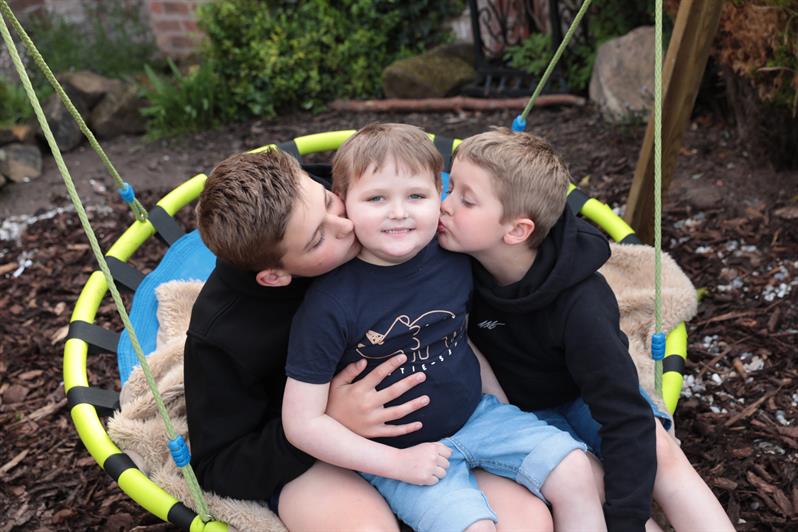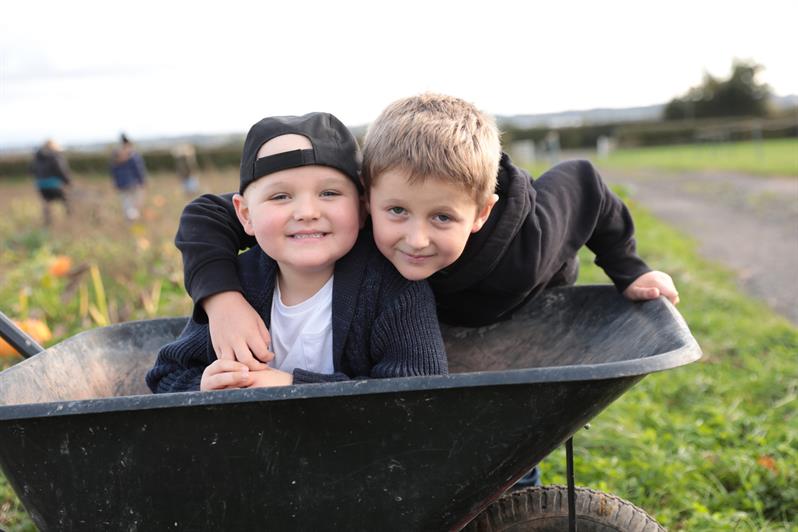.tmb-0945x532.jpg?sfvrsn=ba3c3f69_1)
Image: Tommy Edwards with his parents, Jo and Chris. Credit: ICR/John Angerson
Since the day he was born, Tommy has been like a nuclear reactor, just full of energy. When we’d pick him up from school, he’d almost knock us over from running out to meet us.
Tommy was hardly ever ill. If his brothers got a cold, they’d be poorly for a couple of days. But Tommy would just lie down for an hour and then be back to normal.
It was the Easter holidays when we first noticed a few little signs that something wasn’t quite right. For two weeks Tommy was subdued, sitting indoors watching cartoons more than usual. He was pale and had some bruises on his shins that wouldn’t go away. He was also waking up with bits of blood around his nose, like little nose bleeds.
We thought it was just a bug, so at the end of the holidays he went back to school. The next day his teacher called my wife, Jo, as they noticed he wasn’t his normal self. Jo was looking online and came across the symptoms of acute lymphoblastic leukaemia (ALL), a type of blood cancer. They sounded like Tommy’s symptoms, but I couldn’t believe that it was that.
Tommy said, ‘Don’t cry Mummy, I’m going to be fine’
We picked Tommy up from school and went to the GP. We were sent straight to the Princess Royal Hospital in Telford and were there for most of the day. It was during the coronavirus pandemic, and only one parent could go in at a time, so I was in the car park with our other two sons.
Jo phoned asking me to come into the hospital. The doctor said they didn’t know for sure, but they thought it was leukaemia. Jo was crying and I felt like someone had punched me in the stomach. But Tommy said, ‘Don’t cry Mummy, I’m going to be fine’ – which was heartwarming, but also really upsetting at the same time.
The days after that seemed to all merge together. Tommy was diagnosed with ALL and we got transferred to Birmingham Children’s Hospital to start treatment. We were told that Tommy would need treatment for three years.

Image: Tommy Edwards with his brothers, George and Henry. Credit: Jo Edwards
It was psychologically very hard
We had to explain it to our other sons. Henry was too young to understand, but George, the eldest, could and we were open with him from the start. He asked us whether Tommy could die, and we had to be honest and say yes.
The first couple of months were psychologically very hard for us. Tommy was an in-patient for the first month. The coronavirus restrictions on visitors meant we couldn’t all be together, which made it very tough.
Tommy started on steroids, got a central line fitted and then started receiving a type of chemotherapy called vincristine intravenously. The steroids made him put on a lot of weight – he couldn’t walk properly and his back hurt.
Some of the little things were the hardest. Tommy wouldn’t have his medicine and it took two to three hours every morning and every night to get syringes of medicine into him. He didn’t like thumb pricks or the cannula.
Around six months into treatment, Tommy lost all his hair, which he found really hard. So, George, Henry and I shaved our heads too. Tommy still hates having his hair cut now.
I couldn’t be prouder of how he’s dealt with it
Since the initial treatment, Tommy now has maintenance therapies, including daily medicine, monthly steroids and chemotherapy, and regular lumbar punctures. He’s responded well and in 2024, he’ll be finishing treatment. He wants a limo home from hospital and a party with all his friends to celebrate. It's been three years of treatment and upheaval, and I couldn’t be prouder of how he’s dealt with it all.
Once Tommy finishes his steroids, the pains and backache should fade. There’s no reason that he shouldn’t go on to lead a normal life. I remember a few weeks into Tommy’s treatment asking the oncology nurse whether you ever get to a point when you relax and not worry about it. Maybe we never will, but now it feels more like there’s a route to a normal life.

Image: Tommy Edwards with his brother Henry. Credit: Jo Edwards
We needed something positive to focus on
I was in hospital with Tommy and Jo sent me a link to a newspaper article about the work of Professor Sir Mel Greaves at The Institute of Cancer Research (ICR). Sir Mel has spent decades researching why children develop leukaemia and what can be done to stop it. It’s complex, but one key element is the lack of exposure to infection for young children, so their immune system isn’t primed. It rang lots of bells for us with Tommy.
I went onto the ICR’s website and emailed Sir Mel. I was pleasantly surprised he replied, and it went from there. Mel and his team are looking at the idea of having something like a probiotic drink that could prime the immune system to stop this happening to children. I thought, ‘Wouldn’t that be brilliant?’
Jo and I talked about needing something positive to focus on. We decided to set up a charity called Prevent ALL, with the idea of funding research into the condition and supporting other families facing an ALL diagnosis.
09e95bcb659564f3a772ff0000325351.tmb-0945x532.jpg?sfvrsn=937c3f69_1)
Image: Tommy Edwards. Credit: ICR/John Angerson
Every child should get a good start in life
Having the charity means we can give something back. We’re helping to fund Sir Mel and his team's research to better understand ALL and develop treatments that are better and kinder for children with cancer in the future. We also support children going through treatment by buying toys and treats for them.
We're very lucky Tommy’s had the brilliant treatments he’s had. When I was a child, the odds of survival and the medicines and the treatments were nowhere near what they are now.
It’s important to us to try and do our bit to help families like ours. We need to stop other children from having to go through this. Not everybody gets the privilege of growing old, but every child should get a chance to have a good start in life.
We are world-leaders in the study of cancer in children, teenagers and young adults and have made the huge strides over the past decade in improving treatment options for children with cancer.
With your help, we can make the hope of safer, kinder and more effective treatments a reality for more children with cancer.
Your ongoing support will help us to fund life-saving research – so that more children with cancer are cured, more kindly.